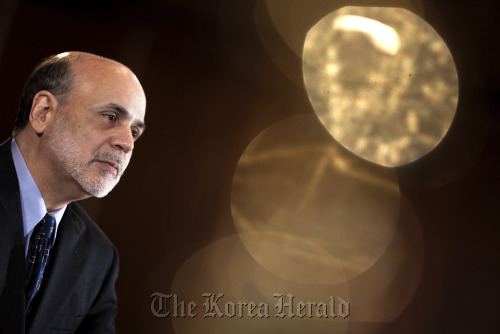WASHINGTON (AP) ― Federal Reserve Chairman Ben Bernanke may feel surrounded when he testifies before Congress this week.
From his left, Democrats will demand to know what the Fed can do to create jobs, especially after the government reported last week that unemployment rose to 9.2 percent in June and the economy generated just 18,000 net new jobs.
From his right, Republicans will likely question the Fed’s complicity in high energy and food prices.
“The Fed has become a very convenient whipping post for members of Congress,” says Sarah Binder, a George Washington University political scientist who has studied the Fed’s relations with Congress.
 |
Ben S. Bernanke, chairman of the U.S. Federal Reserve (Bloomberg) |
But Bernanke won’t just play defense.
He’s expected to issue a strong warning to lawmakers to raise the nation’s debt limit before an Aug. 2 deadline. On that day, the government won’t have enough money to pay all its bills and could default on its debt. “We believe he will be very harsh and direct when it comes to the issue of a U.S. default,” says David Kotok, chairman of the investment firm Cumberland Advisors. “He will ask the Congress not to play games with the debt limit.”
Negotiations have bogged down. Republicans reject Democratic proposals to include any tax increases in any deal to slash the federal government’s deficits in exchange for raising the $14.3 trillion debt limit. Economists fear the threat of default will send interest rates soaring and risk tipping the economy back into recession.
Bernanke is also expected to once again urge Congress to postpone deep spending cuts as part of any deficit-reduction plan. He believes big cuts right away would jeopardize the economy, still fragile two years after economists say the Great Recession officially ended.
Speaking before the House Financial Services Committee Wednesday and the Senate Banking Committee Thursday, the Fed chairman will explain why the Fed ended a $600 billion bond-buying program on schedule last month. The purchases were designed to jolt the economy by pushing down long-term interest rates. Economists say the program probably did help the economy pick up speed late last year. Lower rates encouraged consumers to spend. And the purchases triggered a strong rally in the stock market. Higher stock prices made investors feel wealthier and more willing to go shopping.
Bernanke unveiled the bond purchases last year after the economy lost momentum. The Fed chief was worried then that United States might slip into a deflationary spiral. Deflation is a broad and prolonged drop in wages, the prices of goods and services and the value of assets such as stocks and houses. The country last experienced serious deflation in the Great Depression of the 1930s.
Now economic growth has slowed again this spring and summer, and unemployment has gone up three straight months. But the Fed has all but ruled out another round of bond purchases.
There’s a big difference between now and a year ago: The deflation threat has faded, replaced by a run-up in the prices of oil and other commodities. Critics charge that the billions the Fed pumped into the system by buying bonds lowered the value of the dollar and contributed to the spike in oil and food prices.
The economists at IHS Global Insight say the Fed should be considering another round of bond purchases after recent signs of economic weakness.
But Bernanke has said he believes the latest economic problems are largely “transitory” ― the result of high oil prices that are already falling again and a disruption in factory production caused by a massive earthquake in Japan. The Fed expects economic growth to pick up speed in the second half of the year and for unemployment to drop to 8.9 percent or lower by year’s end. Still, the Fed says the economy remains weak enough for it to keep short-term interest rates near zero indefinitely.
Last month, the Fed cut its forecast for economic growth this year to a range of 2.7 percent to 2.9 percent. It had previously expected the economy to grow 3.1 percent to 3.3 percent this year.
Former Fed economist Roberto Perli, now managing director at the International Strategy & Investment Group, doesn’t expect the Fed to change its policies until it gets a clearer view of where the economy is headed. “What can they do? We’re going through a soft patch,” Perli says.
If anything, Friday’s weak jobs report may convince the Fed to delay until 2013 to raise short-term interest rates, withdrawing support from the economy, says Alan Levenson, chief economist at T. Rowe Price. Before the dismal jobs numbers, Levenson had expected the Fed to raise rates next year.








